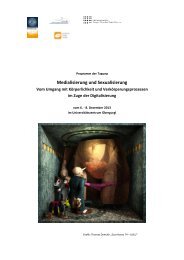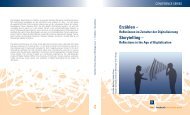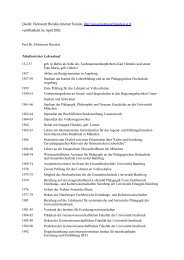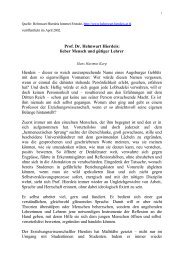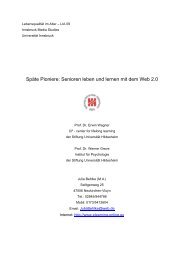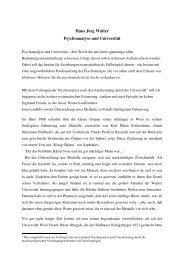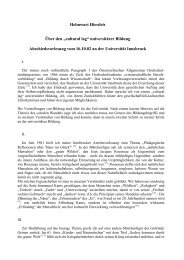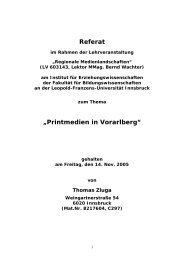Download pdf - Universität Innsbruck
Download pdf - Universität Innsbruck
Download pdf - Universität Innsbruck
Sie wollen auch ein ePaper? Erhöhen Sie die Reichweite Ihrer Titel.
YUMPU macht aus Druck-PDFs automatisch weboptimierte ePaper, die Google liebt.
Introduction 9<br />
ing within free software projects and the rich and subtle institutional and normative<br />
frameworks that have evolved over the last decade.<br />
The German language section starts with a set of papers on theoretical aspects of sharing.<br />
Alexander Unger investgates how mediatization has impacted on sharing as a basic social<br />
practice, using the cultures of remix and modding as examples. Next, Manfred Faßler<br />
describes how the meaning of sharing shifts away from caring and distributing towards<br />
sharing as a contribution towards production. Hans-Martin Schönherr-Mann begins his<br />
contribution with the seemingly simple question “was heißt Teilen”—meaning both ‘what<br />
does sharing mean’ and ‘what calls for sharing?’—in order to then explore the motivation<br />
to share as simulation and seduction, drawing on Baudrillard and Lacan, amongst others.<br />
Tobias Hölterhof examines the relevance of German 20 th century philosopher Max<br />
Scheler’s phenomenology and ethics for social networks, focusing on the key concept of<br />
sympathy and its potential for an ethics of sharing. Claudia Paganini takes us back to the<br />
earliest writings of the Jewish-Christian traditions, enquiring into the modes of sharing<br />
information described in these books, and what they might tell us in terms of a current<br />
ethics of the media. Michael Funk examines the sharing of knowledge by distinguishing<br />
between theoretical knowledge and bodily knowledge and explores sharing in Indian and<br />
European classical music.<br />
The last section of the book is on practices of sharing. The first of three contributions to<br />
this section is by Doreen Hartmann, who enquires into the relationship between openness<br />
and competition, looking at the subcultural values of the hacking, cracking and demoscene<br />
subcultures. Next, Aletta Hinsken looks at citations in pop literature as a way of sharing<br />
that is used in building identities. The final contribution of the book is by Klaus Rummler<br />
and Karsten D. Wolf and their empirical examination of the use of shared videos in learning<br />
processes.<br />
The papers point into a lot of different directions, many hopeful, others less so. The debate<br />
on, and the research into practices of sharing are only beginning and we hope that these<br />
essays will contribute to deepening and expanding our vision of how sharing can transform<br />
society.<br />
The conference ‘Cultures and Ethics of Sharing’ was the third in a series of conferences on<br />
“Media, Knowledge & Education” organized by the interdisciplinary forum <strong>Innsbruck</strong><br />
Media Studies (http:/medien.uibk.ac.at) in collaboration with the Department of Information<br />
Systems, Production and Logistics Management at the University of <strong>Innsbruck</strong><br />
(http://www.uibk.ac.at/wipl/index.html.en). It was conducted as part of a research project<br />
on media activism funded by the Austrian Science Fund (project P21431-G16) and held by<br />
the editors with support of the Austrian Federal Ministry of Science and Research, the<br />
Austrian Science Fund (FWF), the Austrian Association of Research and Development in<br />
Education (ÖFEB), the University of <strong>Innsbruck</strong> and its Faculty of Education as well as its



